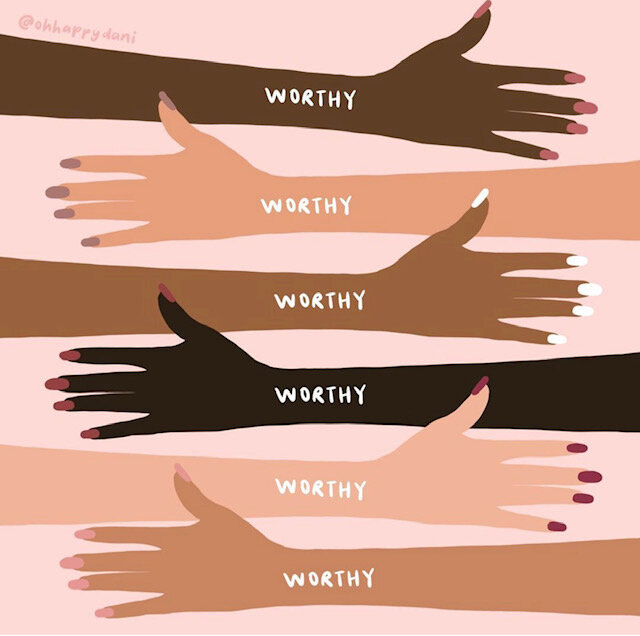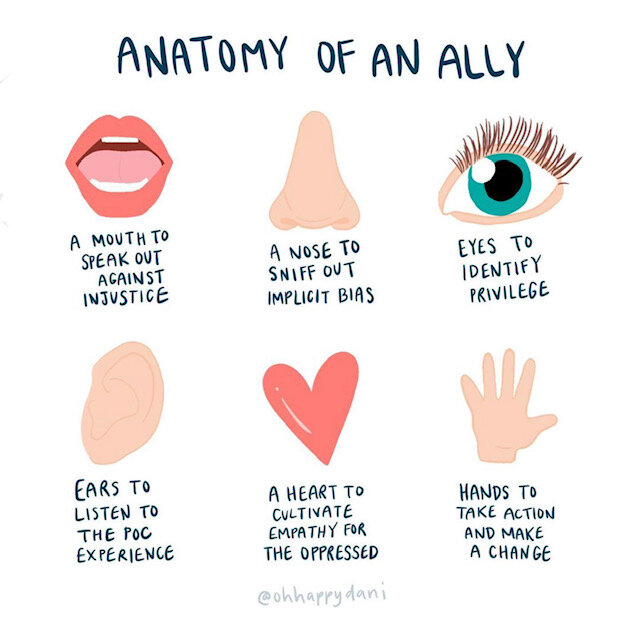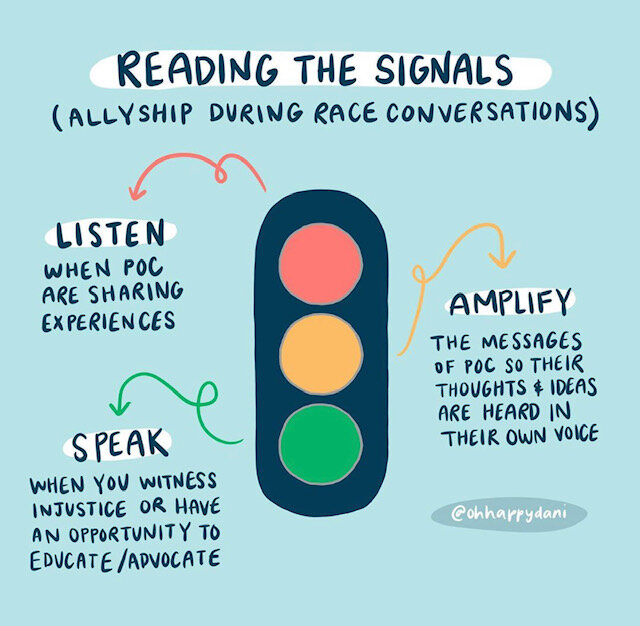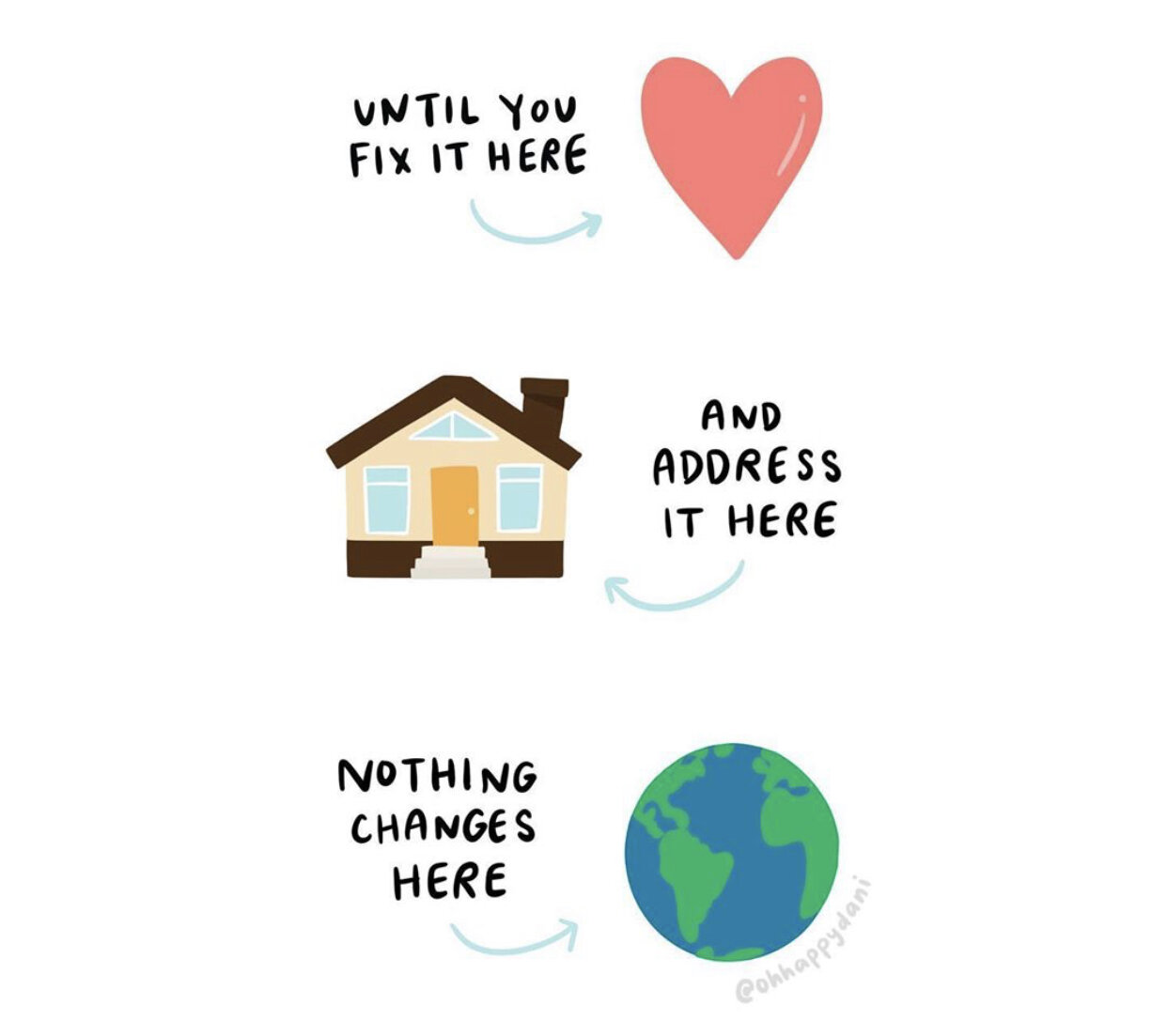How to Be Anti-Racist
I stand in solidarity with the Black community against racism, hate, and injustice— and I know you do, too.
You may have even said to yourself, “…but I’m not racist”. It’s not enough to be "not racist” anymore. We need to be actively anti-racist.
As Will Smith so perfectly stated, “Racism isn’t getting worse, it’s getting filmed.” It’s 2020, we’re here, and now we (the people) need to do anything we can about it.
To put things into perspective, imagine it is you who died, under a police officer’s knee crushing your neck, causing you to run out of oxygen, because your skin color is darker than theirs. Imagine it was you who was video taped and that video clip went viral. What would you want/expect your friends, family, and community to do about it? You’d want justice, even though you’re already gone, because NO ONE should have to die like this.
George Floyd should not have died that way.
Neither should have Breonna Taylor, Ahmaud Arbery, Sean Reed, Tony McDade— to name a few.
Many feel hopeless and don’t know what to do to help.
Should I post about Black Lives Matter… or should I not? What is the right thing to say? What if I mess it up? What if I get flack for posting? Should I donate to an organization? Where should I donate? Should I write my congressman? Should I write a letter to the police? Should I ask my black friend what to do?
Hopefully, this compiled list of ideas on how to be actively anti-racist can help you. You don’t have to do all the things, but doing some/as many as you can will help.
MY TWO-CENTS
-Mean what you say. If you want to express “Black Lives Matter”, say that. If you mean to say “Enough is enough”, say that. Judging whether or not looting/rioting is appropriate when you mean to address “Black Lives Matter” and/or “Enough is enough” are NOT the same thing.” Please keep that in mind.
-When you post artwork on anti-racism, racism, Black Lives Matter, etc., be sure to give credit to the artist, whenever possible. @ohhappydani said it so perfectly when she wrote, “Just a reminder that, by you stealing justice-related art and intentionally posting it as your own, you are reinforcing the same system that we are trying to dismantle. You are not amplifying us, you are centering yourself.”
-Create a group amongst friends to hold one another accountable to taking actionable steps to be anti-racist. Create a time line, set some goals, check in on one another weekly, and either reset the goals or create new ones once your timeline ends. “Enough can never be enough” when we’re talking about doing the right thing to help society.
-Recognize your privilege if you’re not a POC (person of color). You’re not them and can’t understand what they’re going through or will go through. Listen to POC’s experiences and let them know you’re there for them.
-When you witness injustice of have an opportunity to educate/advocate… do so. Even if it means having a tough conversation with a loved one, it’s the right thing to do. We cannot stay silent/complacent anymore.
-You’re not going to make everyone happy. That’s not possible. Do what’s right instead.
CAREER CONTESSA offers…
-@lisaoliveratherapy has some journal prompts that can get the conversation started
@courtneyahndesign also created a guide to white privilege
-”Girls Night In” created this antiracism resource roundup
-Listen to this episode on how to navigate power and privilege at work
We need to BE USEFUL right now and that means going beyond a post on social media.
@ijeomaoluo and @meena both share ways to take action including donating money to Black-led organizations, call your reps, use your voice to elevate the voices of Black people, actively call out racism, continue to educate ourselves on race and racism without putting that burden on Black people, and refuse to accept the unjust murder of George Floyd and so many others.
THE WING…
Donated money to Color of Change, The NAACP Legal Defense Fund, and The Brooklyn Community Bail Fund. They state that this isn’t their only step, but it’s the step they made today (June 1st).
Suggests…
-Contributing to a local community bail fund through the National Bail Fund network
-Supporting the NAACP Legal Defense Fund which supports racial justice through advocacy, litigation, and education.
-Committing to dismantle racism through self-education and by reading anti-racist literature
IBRAM X KENDI wrote a book on “How To Be Anti-Racist”. He offers these points…
1) Understand the definition of racist.
2) Stop saying “I’m not racist.”
3) Identify racial inequities and disparities.
4) Confront the racist ideas you’ve held or continue to hold.
5) Understand how your antiracism needs to be intersectional.
6) Champion antiracist ideas an policies.
Justice-Related Artwork by @ohhappydani
This is a substantive, longer list provided by
RENT THE RUNWAY
Articles to read:
“America’s Racial Contract Is Killing Us” by Adam Serwer | Atlantic (May 8, 2020)
Ella Baker and the Black Freedom Movement (Mentoring a New Generation of Activists
”My Life as an Undocumented Immigrant” by Jose Antonio Vargas | NYT Mag (June 22, 2011)
The 1619 Project (all the articles) | The New York Times Magazine
“The Intersectionality Wars” by Jane Coaston | Vox (May 28, 2019)
Tips for Creating Effective White Caucus Groups developed by Craig Elliott PhD
”White Privilege: Unpacking the Invisible Knapsack” by Knapsack Peggy McIntosh
“Who Gets to Be Afraid in America?” by Dr. Ibram X. Kendi | Atlantic (May 12, 2020)
Videos to watch:
"How Studying Privilege Systems Can Strengthen Compassion" | Peggy McIntosh at TEDxTimberlaneSchools (18:26)
The Daily Show and follow @thedailyshow
}Podcasts to subscribe to:
Books to read:
Black Feminist Thought by Patricia Hill Collins
Eloquent Rage: A Black Feminist Discovers Her Superpower by Dr. Brittney Cooper
Heavy: An American Memoir by Kiese Laymon
How To Be An Antiracist by Dr. Ibram X. Kendi
Just Mercy by Bryan Stevenson
Me and White Supremacy by Layla F. Saad
Raising Our Hands by Jenna Arnold
Redefining Realness by Janet Mock
Sister Outsider by Audre Lorde
So You Want to Talk About Race by Ijeoma Oluo
The Bluest Eye by Toni Morrison
The Fire Next Time by James Baldwin
The New Jim Crow: Mass Incarceration in the Age of Colorblindness by Michelle Alexander
The Next American Revolution: Sustainable Activism for the Twenty-First Century by Grace Lee Boggs
The Warmth of Other Suns by Isabel Wilkerson
Their Eyes Were Watching God by Zora Neale Hurston
This Bridge Called My Back: Writings by Radical Women of Color by Cherríe Moraga
When Affirmative Action Was White: An Untold History of Racial Inequality in Twentieth-Century America by Ira Katznelson
White Fragility: Why It's So Hard for White People to Talk About Racism by Robin DiAngelo, PhD
Films and TV series to watch:
13th (Ava DuVernay) — Netflix
American Son (Kenny Leon) — Netflix
Black Power Mixtape: 1967-1975 — Available to rent
Clemency (Chinonye Chukwu) — Available to rent
Dear White People (Justin Simien) — Netflix
Fruitvale Station (Ryan Coogler) — Available to rent
I Am Not Your Negro (James Baldwin doc) — Available to rent or on Kanopy
If Beale Street Could Talk (Barry Jenkins) — Hulu
Just Mercy (Destin Daniel Cretton) — Available to rent
King In The Wilderness — HBO
See You Yesterday (Stefon Bristol) — Netflix
Selma (Ava DuVernay) — Available to rent
The Black Panthers: Vanguard of the Revolution — Available to rent
The Hate U Give (George Tillman Jr.) — Hulu with Cinemax
When They See Us (Ava DuVernay) — Netflix
Organizations to follow on social media:
Antiracism Center: Twitter
Equal Justice Initiative (EJI): Twitter | Instagram | Facebook
The Leadership Conference on Civil & Human Rights: Twitter | Instagram | Facebook
National Domestic Workers Alliance: Twitter | Instagram | Facebook
Showing Up for Racial Justice (SURJ): Twitter | Instagram | Facebook
Resources for parents to raise anti-racist children:
Books:
Podcasts:
Article: PBS’s Teaching Your Child About Black History Month
The Conscious Kid: follow them on Instagram and consider signing up for their Patreon
More anti-racism resources to check out:
Resources for White People to Learn and Talk About Race and Racism
“Why is this happening?” — an introduction to police brutality from 100 Year Hoodie
Where to donate if you would like to:
If You Want to Provide Bail for Protesters:
Minnesota Freedom Fund
The MFF is a local organization that pays for criminal bails and immigration bonds, and has vowed to help free protesters incarcerated by police. As of Friday there have been thousands of new donors to the fund, with many contributors on social media matching pledges within their networks. Give here.
If You Want to Help Protesters with Legal Fees:
Know Your Rights Camp
Founded by Colin Kaepernick, the Know Your Rights Camp works to empower black and brown communities by providing free education and other resources. Its latest initiative in Minnesota is focused on hiring defense attorneys for anyone arrested protesting police brutality. Donate here.
The American Civil Liberties Union (ACLU)
The ACLU is a nationwide nonprofit that operates in all 50 states and provides legal assistance wherever civil liberties are at risk. "Make no mistake: George Floyd should be alive today," ACLU policing policy advisor Paige Fernandez said in a statement. "The officers responsible must be held accountable. The public has seen the video. To call this a 'medical incident' is an insult." You can donate to the local chapter in Minnesota here.
If You Want Every Vote to Count:
Fair Fight
The dearth of humane political leadership in moments of crisis can make anyone feel hopeless. Fair Fight, an organization focused on free and fair elections, was founded by Georgia democrat Stacey Abrams with a mission to end voter suppression and elect more progressive voices to public office. You can donate here.
If You Want to Ensure the Freedom of the Press:
Committee to Protect Journalists (CPJ)
With the media a frequent target of the president, press freedoms are more vital than ever. (On Friday alone, Minnesota state police arrested a black CNN reporter live on air for no clear reason.) CPJ is an independent organization that fights against press freedom violations worldwide, both through diplomatic efforts and by working with local legal organizations. Donate here.
Some of these resources were compiled by Sarah Sophie Flicker, Alyssa Klein in May 2020.



